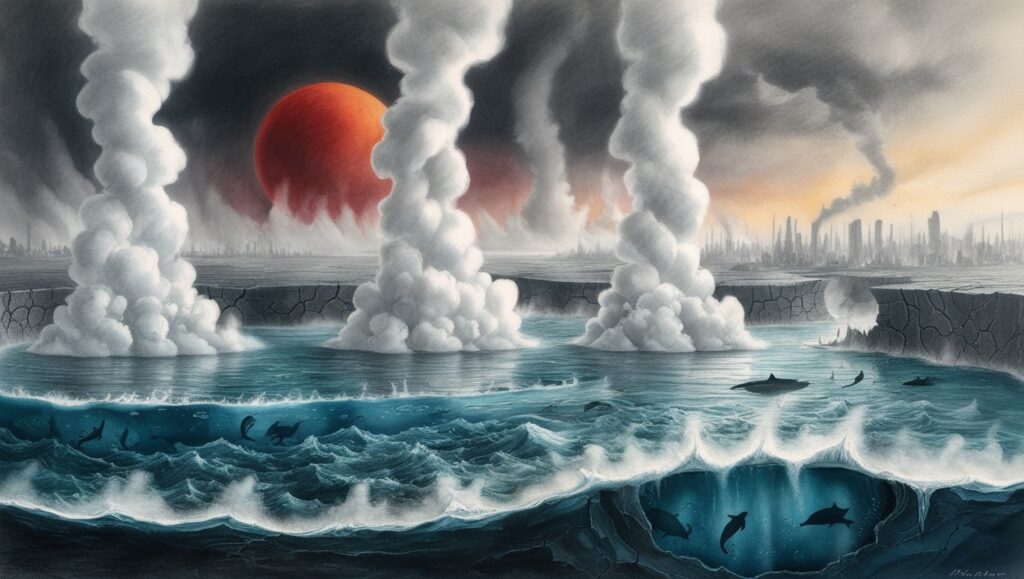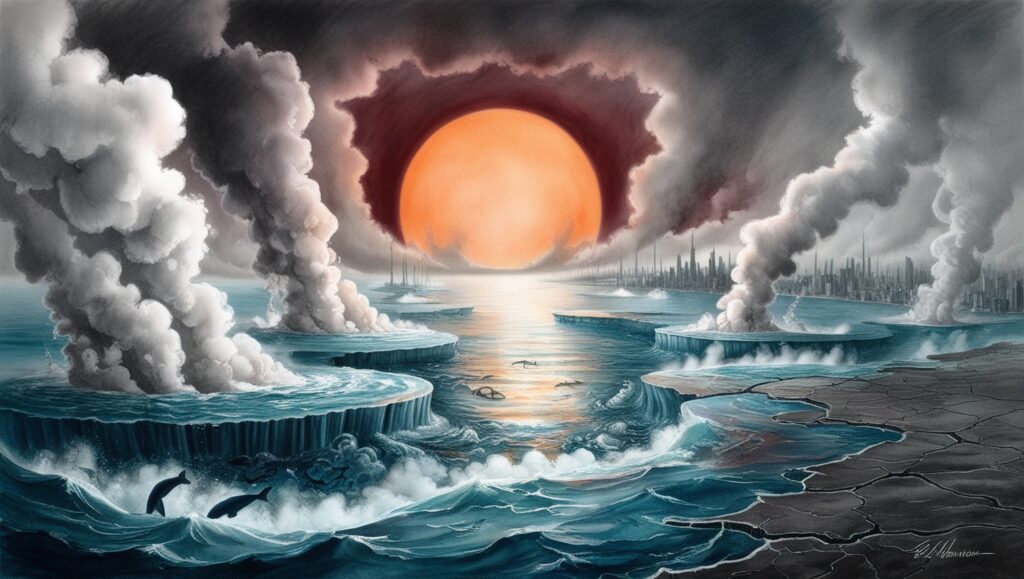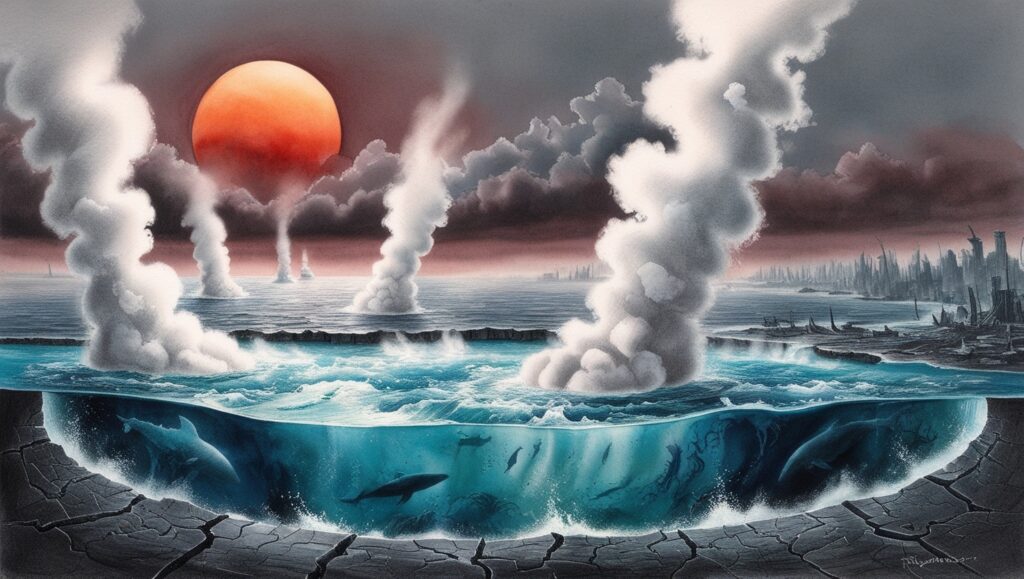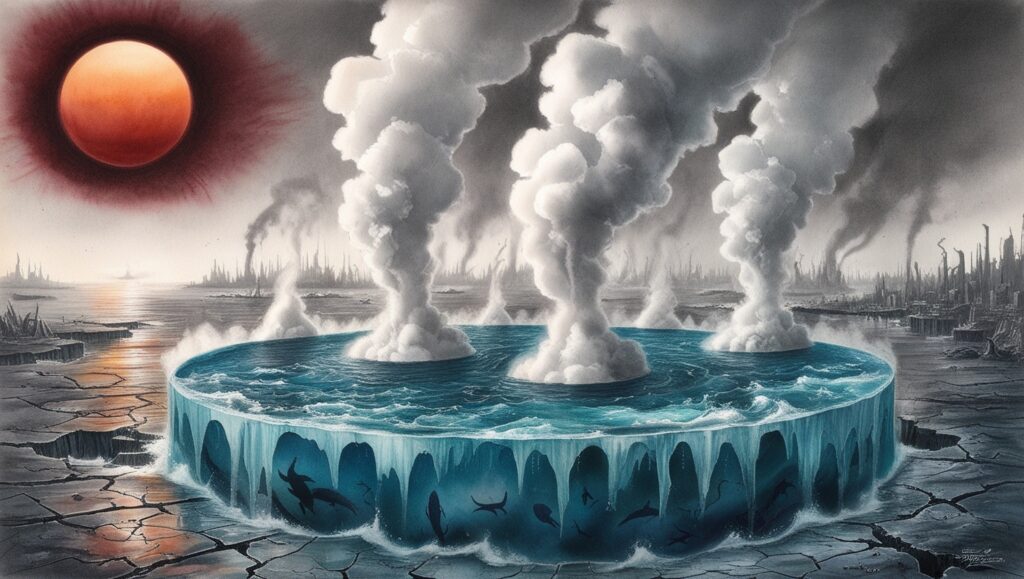What If the Oceans Began to Boil 2025
What If the Oceans Began to Boil 2025
Imagine waking up one morning to find the oceans — the lifeblood of our planet — starting to boil. The waves no longer gently crash against the shore, but instead rise as searing steam clouds. The skies darken with vapor, and marine life begins to vanish in seconds. This chilling scenario isn’t a scene from a sci-fi film. It’s a hypothetical journey into what could happen if Earth’s oceans truly began to boil. Let’s dive deep into this wild “what if” and explore its consequences, mechanisms, and the cascading impact it would have on the entire planet.
The Boiling Point of Water: Why It Matters
To understand the magnitude of this scenario, we first need to revisit some basic physics. Water boils at 100°C (212°F) at sea level under normal atmospheric pressure. But the ocean isn’t a kettle — it’s a vast, interconnected system that covers over 70% of Earth’s surface.
Because of pressure differences at various ocean depths, water deep down requires significantly more heat to boil. For example, at 1,000 meters (about 3,280 feet) below sea level, the pressure is around 100 times higher than at the surface. At that depth, water would only boil if heated to roughly 300°C (572°F).
For the oceans to begin boiling, something catastrophic must increase Earth’s temperatures drastically — possibly due to extreme solar radiation, a powerful gamma-ray burst, or an artificial event like a runaway greenhouse effect on steroids.
What Could Cause the Oceans to Boil?
Let’s explore a few extreme hypothetical causes:
1. A Runaway Greenhouse Effect
Earth’s atmosphere traps heat via the greenhouse effect. However, if too many greenhouse gases accumulate (CO₂, methane, water vapor), a feedback loop could occur. Venus is a real-world example — scientists believe its oceans boiled away long ago due to such an effect. If Earth followed a similar path, temperatures could skyrocket past the boiling point of water.
2. Massive Solar Flare or Gamma-Ray Burst
An intense solar flare or gamma-ray burst aimed directly at Earth could potentially disrupt the atmosphere and lead to catastrophic heating. While unlikely, if such an event did happen, it could rapidly push global temperatures to extreme levels.
3. Artificial Experiments Gone Wrong
In another wild scenario, advanced civilizations experimenting with planetary engineering (geoengineering) or alien technologies might accidentally trigger heat amplification mechanisms that spiral out of control.
Immediate Effects on the Planet
If the oceans began to boil, the consequences would be swift and apocalyptic:
1. Mass Extinction of Marine Life
Most marine species cannot survive beyond temperatures of 40°C (104°F). Boiling temperatures would instantly kill off nearly all marine organisms — from plankton and coral reefs to massive whales. This collapse would destroy ocean ecosystems and the global food web.
2. Gigantic Steam Clouds and Atmospheric Collapse
Boiling oceans would release trillions of tons of water vapor into the atmosphere. Since water vapor is itself a potent greenhouse gas, it would amplify global warming further. The skies would become shrouded in thick clouds, likely blocking sunlight — yet the trapped heat beneath could still rise due to infrared radiation imbalance.
3. Loss of Oxygen Supply
Phytoplankton in the ocean produce over 50% of Earth’s oxygen. If oceans boiled and phytoplankton perished, the planet’s breathable oxygen supply would rapidly decline. Within weeks or months, oxygen levels could fall dangerously low.
4. Sea Level Rise & Evaporation Paradox
As the oceans turn into steam, water levels would seem to decrease. However, due to rapid glacial melt caused by heat, there might be an initial, massive surge in sea levels before everything turns to vapor. Coastal cities would vanish quickly, only to later dry up.




Long-Term Consequences
1. Atmospheric Transformation
Our planet would begin to resemble Venus. The atmosphere would become thick, unbreathable, and saturated with steam. Temperatures could rise past 300°C (572°F), making the surface completely uninhabitable.
2. Crustal Instability
As the water cycle collapses, and heat penetrates deeper into the Earth’s crust, we could see an increase in tectonic and volcanic activity. Ocean floor pressure changes might cause earthquakes and the release of methane hydrates — amplifying the greenhouse effect.
3. Loss of the Hydrological Cycle
Without liquid oceans, there would be no rain, no snow, and no rivers. Plants and animals on land would perish. Farming would be impossible. Water, the fundamental resource for life, would no longer cycle through the environment.
4. Collapse of Civilization
Global infrastructures — food, energy, communications — would collapse within days. The energy demand for cooling systems and survival would skyrocket. Governments would likely fail. Humanity, if it survives at all, would be forced underground or into space-based shelters.
Could Humanity Survive?
In such a dire situation, survival would depend on preparation, technological advancement, and a bit of luck. Some potential survival strategies could include:
- Underground cities with closed-loop life support.
- Space colonies (e.g., Moon or Mars bases).
- Cryogenic sleep for future revival.
- Artificial oceans and atmospheric generators in shielded environments.
However, these solutions would only be accessible to a small fraction of the global population. The vast majority of life — human and non-human — would be doomed.
Scientific Lessons from This Hypothetical
While this scenario sounds far-fetched, it teaches us valuable lessons:
- The climate system is delicate. Even small changes can lead to cascading effects.
- Oceans regulate Earth’s temperature and life cycles. Without them, Earth becomes a furnace.
- Geoengineering and unchecked greenhouse gas emissions are not just theoretical concerns; they could one day create irreparable harm.
Final Thoughts
What if the oceans began to boil? The short answer: mass extinction, climate chaos, and the end of civilization as we know it.
The long answer, as we’ve seen, involves understanding the systems that make life on Earth possible. While this scenario is purely speculative, it reminds us why protecting Earth’s delicate balance is not just good science — it’s a necessity.
Let’s never boil the kettle of the planet.
🔗 Related Educational Reads from Our Blogs:
What If Dreams Could Be Recorded and Played Back 2025
https://edgythoughts.com/what-if-dreams-could-be-recorded-and-played-back-2025
What If Time Works Differently in Deep Space 2025
https://edgythoughts.com/what-if-time-works-differently-in-deep-space-2025
📖 Learn More About Oceanic Science:
https://en.wikipedia.org/wiki/Ocean





